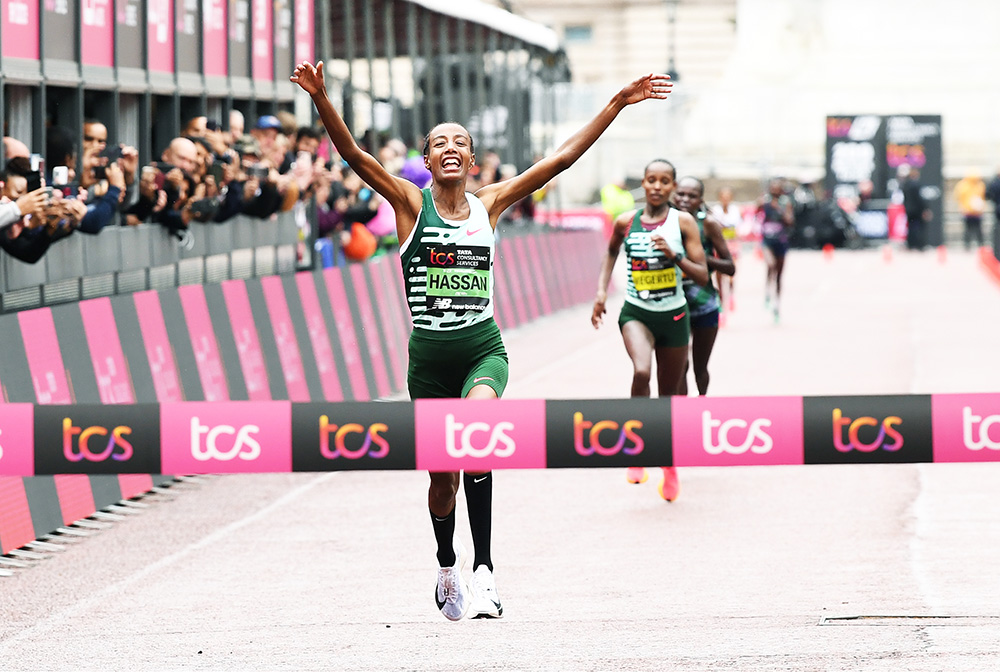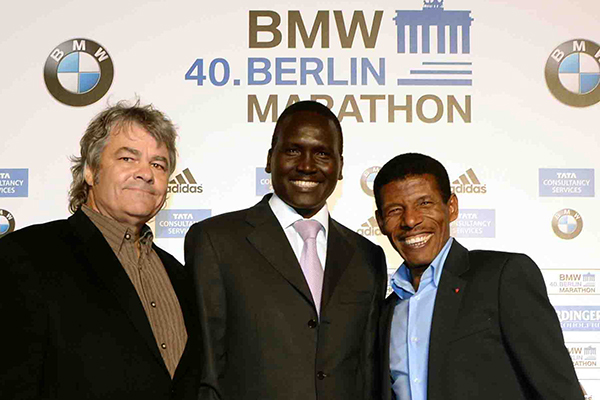
LONDON, ENGLAND, April 23 — In a matter of 20 minutes, Sifan Hassan’s prospects for a debut win at the London Marathon swung from the implausible to the inevitable. The Dutch track superstar closed a 14-second gap between 35 and 37K, then ran with the lead quartet until the finishline was in sight before unleashing her gold medal sprint.
Her improbable victory came after repeatedly stopping midrace to stretch a bothersome quad, and ended as she stopped the clock in 2:18:33.
“Yes, I finished the marathon and I am the winner,” the 30-year-old Hassan proclaimed. “I feel amazing; I feel that a dream has come true, my gratitude has no limit. I have great respect for the marathon. This is the hardest challenge.”
Ethiopian Alemu Megertu finished 2nd in 2:18:37, Olympic champion Peres Jepchirchir followed in 2:18:38. Sheila Kiprotich (4th in 2:18:51) and Yalemzerf Yehualaw (5th in 2:18:53) also bettered 2:19 running amid cool 50-degree temperatures and off-and-on light rain.
This was largely a race of attrition as Jepchirchir seemed intent on pressing a hard pace to secure her sixth straight marathon win and bettering Mary Keitany’s women-only WR of 2:17:01. For much of the race, Hassan was a subplot as she lagged behind the lead group attending to a gimpy leg.
Hassan had dinged her left quad hammering out a 20K hard surface road test two weeks out. This was just one of a series of hiccups in her preparations complicated by fasting during Ramadan that lasted through Thursday evening before Sunday’s race.
While Hassan was able to make it to the starting line, British sensation Eilish McColgan pulled out two days before the race with a knee injury, and World Record holder Brigid Kosgei appeared even worse off as she ran painfully slowly through the first kilometer before waving goodbye.
An all-women pacing crew led a pack of 10 competitors through opening 5K segments of 16:13, 16:24 and 16:06 to cross 15K in 48:43 — spot on Keitany’s record pace.
Hassan was already seemingly in trouble, running at the back of the pack and looking rather uncomfortable, both in her stride and managing the water stations.
“I had no practice,” Hassan confessed, “and I had problems drinking. I was choking on it but luckily I had no stomach problems.”
Her real issue was with her leg that hurt early on: “I was thinking, ‘How far can I go with this leg?’ At 15K I thought, ‘OK now I am done.’ I wanted to go on 2 or 3 kilometers or maybe halfway to get more experience, so I started stretching.”
Just over an hour into her debut, Hassan stopped twice to stretch the quad. Despite making quick work of it, she trailed by 12 seconds at 20K, and was 11 seconds behind the leaders’ 68:29 halfway split. However, the deficit soon grew to 28 seconds as Jepchirchir sped through a robust 15:54 split for the 20–25K to cross in 1:20:52 — well under Keitany’s record pace with a 2:16:29 projected finish.
Hassan kept a steadier pace with a 16:10 split, but more importantly started feeling much better: “I was so happy to get more kilometers and when I get to 25 I said, ‘This is good.’ I got a drink and I was feeling more energy and I also got a lot of energy from the crowd. They were cheering that I am catching them.”
Hassan had found her stride and quickly closed in on the lead group with a 16:03 split to 30K that left her 3 seconds back as the lead group of 6 split 16:28 on 2:16:54 pace.
Jepchirchir, ever aware that the reigning Olympic 10,000 champion was closing fast, hit the gas after the 30K aid station, a move that almost immediately put an end to Genzebe Dibaba’s debut aspirations, with Judith Korir also falling back.
Jepchirchir’s surge knocked Hassan to the ropes, and she quickly lost ground. Hassan was 14 seconds back when Jepchirchir & Company crossed 35K in 1:53:40 with a 16:20 split — now on 2:17:02 pace.
Whatever the reason, Jepchirchir had grown weary with her constant frontrunning and stopped pushing, and the sight of the slowing pack revived Hassan’s hopes.
“At 35K, I was struggling,” Hassan admitted, adding “even with breathing. I was suffering but after seeing them I feel so much energy. I could sprint and catch them but the problem with my leg was that even with a little bit of increase it would catch. The leg controlled me.”
Hassan’s hobbled pace was enough to close the gap and 2 hours into the race she reconnected with the lead group with a little over 5K to go.
“When I found myself with the lead group I was so shocked,” she said. “I was already celebrating before I finished.”
Undoubtedly her rivals picked up on Hassan’s vibe. With the feared sprinter back onboard, the lead group slowed appreciably with each kilometer like cyclists sitting up and waiting for the finishing drive. The lead group split just 17:15 to hit 40K in 2:10:56, and would slow even more on the runin.
Hassan managed one last bout of water station misadventure as she was late to spot the 40K aid station, but quick enough to streak across the road, inches ahead of a motorbike, before making the grab.
With 2K to go the inevitable set in as it seemed to be a case of not if but when Hassan would strike. After coping with leg issues the whole way, she was in no hurry to sprint: “Even when I saw the sign for 200 meters, I was waiting for someone to move as I didn’t know what to expect from my body.”
Megertu lifted the pace with 600 to go dropping Yalemzerf, then accelerated around the final turn to open space on Jepchirchir before Hassan cut loose flying away to a 3-second win.
“I didn’t want to move until I saw the finish line,” Hassan cautioned, “I kicked in at 80% to be sure I would get there.”
Hassan’s outstanding debut admittedly complicates her future with the Budapest WC and Paris Olympics on the horizon.
“I really enjoyed the marathon,” she said. “I even enjoyed the journey with this weird leg thing, especially after I finished. As much as I enjoyed the experience, I also want to stay on the track. The funny thing is that I want to do 1500 meters and see how fast I can run, I don’t want to do just 10K.
“After the World Championships I want to jump into the marathon and see what I can do.”
Don’t we all.
LONDON WOMEN’S RESULTS
1. Sifan Hassan (Neth) 2:18:33 (debut) (68:40/69:53); 2. Alemu Megertu (Eth) 2:18:37; 3. Peres Jepchirchir (Ken) 2:18:38; 4. Sheila Kiprotich (Ken) 2:18:51;
5. Yalemzerf Yehualaw (Eth) 2:18:53; 6. Judith Jeptum Korir (Ken) 2:20:41; 7. Almaz Ayana (Eth) 2:20:44; 8. Tadu Teshome (Eth) 2:21:31; 9. Sofiya Yaremchuk (Ita) 2:24:02 PR;
10. Susanna Sullivan (US) 2:24:27 PR; 11. Samantha Harrison (GB) 2:25:59 PR; 12. Dominique Scott (SA) 2:29:19; 13. Ellie Pashley (Aus) 2:29:37;… dnf—Genzebe Dibaba (Eth), Sofia Assefa (Eth), Brigid Kosgei (Ken).
